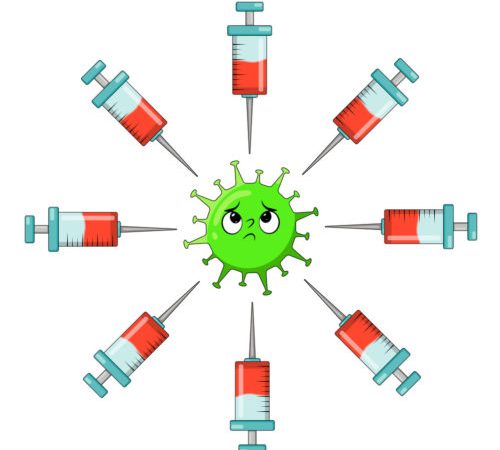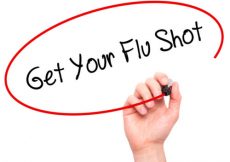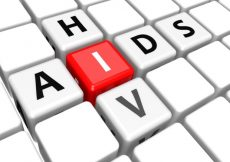November 15th, 2021
We’ve pointed out several times here on The PediaBlog just how popular the COVID-19 vaccines have been with a large majority of American adults, teens, and now children between the ages of 5 and 11. The false narrative pushed by media outlets about vaccine hesitancy runs counter to the everyday experience of healthcare professionals around the nation as the U.S. approaches the one-year anniversary of the first authorization to give Pfizer’s COVID vaccine last December. In less than 11 months, 440 million doses of COVID vaccine have been given to nearly 200 million Americans. 80% have received at least one dose, and 70% of people who are 12 and older are fully vaccinated. By any measure, that is an extraordinary public health success!
But the pandemic isn’t over yet, not by a long shot. Last week, an average of 80,410 Americans tested positive for COVID-19 every day; 45,834 were hospitalized every day because their infections were severe, and 1,128 died every day. The vast majority of cases, hospitalizations, and deaths occurred in unvaccinated individuals, a fact that has been true since the start of the pandemic. By any measure, over 1,000 deaths a day caused by a vaccine-preventable infection is clearly not a success.
Yes, there is still some hesitancy which pediatricians experience with any new vaccine. We typically don’t melt down when we hear the words “I’m not going first,” or “We’re going to wait a few weeks or months to see how things go before we get our child immunized.” Instead, pediatricians collect the data demonstrating safety and efficacy, polish our evidence-based talking points, and get to work convincing parents, one exam room at a time, that immunizing children is the best defense against dangerous vaccine-preventable infections. Most of the time a calm, non-judgemental, fact-based discussion gets the job done. Some parents need more time and more information before they finally agree with their trusted pediatricians to get the shots that keep kids healthy and safe from viral and bacterial threats no one can see.
There are pediatricians around the country caring for children who don’t have uniform, fair, or convenient access to quality medical care. Some people miss out on vaccines because they don’t have insurance coverage to pay for them. Others are busy making ends meet and haven’t had the time yet to get a shot, or maybe they fear missing a day of work recovering from a common side effect like fever, headache, or fatigue. Finding convenient and inexpensive transportation to a vaccine site has been difficult for some, especially in rural areas. Some people get very uncomfortable in medical environments, and some people simply hate needles. But the faulty notion that America has suddenly become filled with science-denying anti-vaxxers with political axes to grind — always a small minority of individuals inhabiting the fringe of a free society — has been overblown.
The vaccine is VERY popular, and extending the availability for children 5 years and up hasn’t hurt its reputation either, explain Hallie Lauer and Jessie Bunch:
Health care providers across the region have seen an increase in demand for COVID-19 vaccines as younger children have started receiving their first doses -—and not just shots for kids.
In the first week since children between the ages of 5 and 11 have been approved to receive the Pfizer COVID-19 vaccine, nearly 19,000 first doses had been administered across the state […]
But the numbers of children — and adults — getting shots continue to grow exponentially.
The good news is parents are eager to get their kids vaccinated against the pandemic virus that has gravely hurt children everywhere, even if it didn’t kill them in the same numbers it did their parents and grandparents. The bad news, Marisa Iati and Lindsey Bever discovered, is that pediatricians, their offices, and their staff are being crushed by the excitement:
As parents like Lowe have sought to immunize their 5-to-11-year-old children, pediatricians say demands for their time have surged to strain the capacities of their practices, many of which are experiencing shortages of nurses and support staff in line with national labor trends. Pediatricians nationwide describe a crush of appointment requests that has both overwhelmed and energized them as they seek to keep children from contracting or spreading the virus that causes covid-19.
Foot traffic through the corridors of pediatric offices and clinics has been brisk for some time now:
The deluge of phone calls began in the summer, when plummeting coronavirus infections spurred day cares and schools to reopen in person, sometimes without mask requirements. Common respiratory viruses surged, and a flood of patients returned for regular checkups and vaccinations that they had delayed at the pandemic’s apex. Pediatricians also continued to monitor the mental health of their patients, many of whom have experienced heightened depression, anxiety or behavioral issues since the pandemic began, doctors said.
Then the highly infectious delta variant of the coronavirus fueled a new wave of cases, which increased the need for testing. Pediatricians quickly found themselves “underwater,” said Michael Martin, president of the Virginia chapter of the American Academy of Pediatrics.
“We’re excited for children to get the vaccine,” said Christoph Diasio, a pediatrician in Southern Pines, N.C. “It’s hard work, but doing hard work is what we do in primary care.”
With 5-to-11-year-olds lining up to get their shots, their younger siblings might be asking, “What about us?” We’ll take a peek at where clinical trials stand for the under-5 crowd tomorrow on The PediaBlog.




































